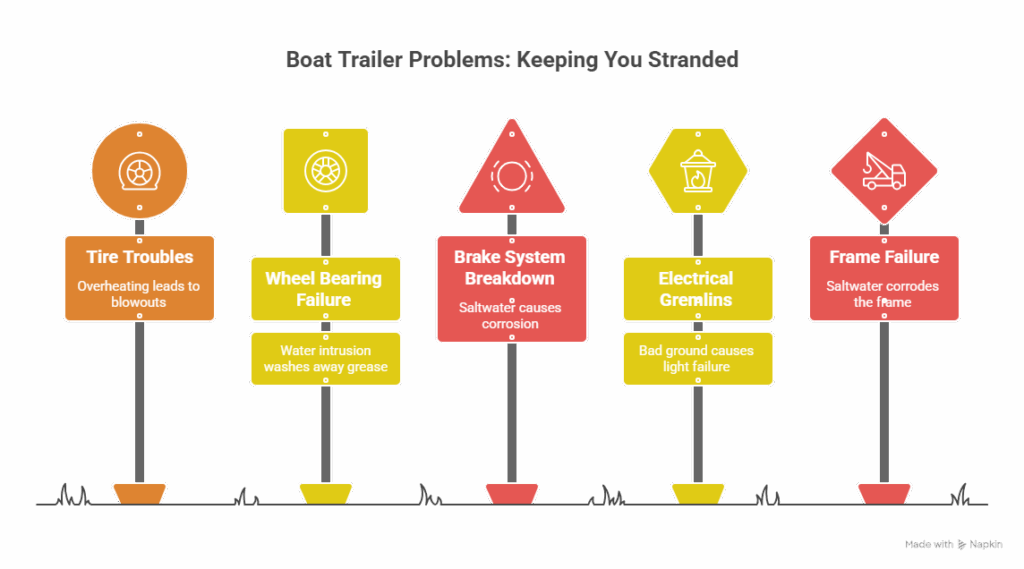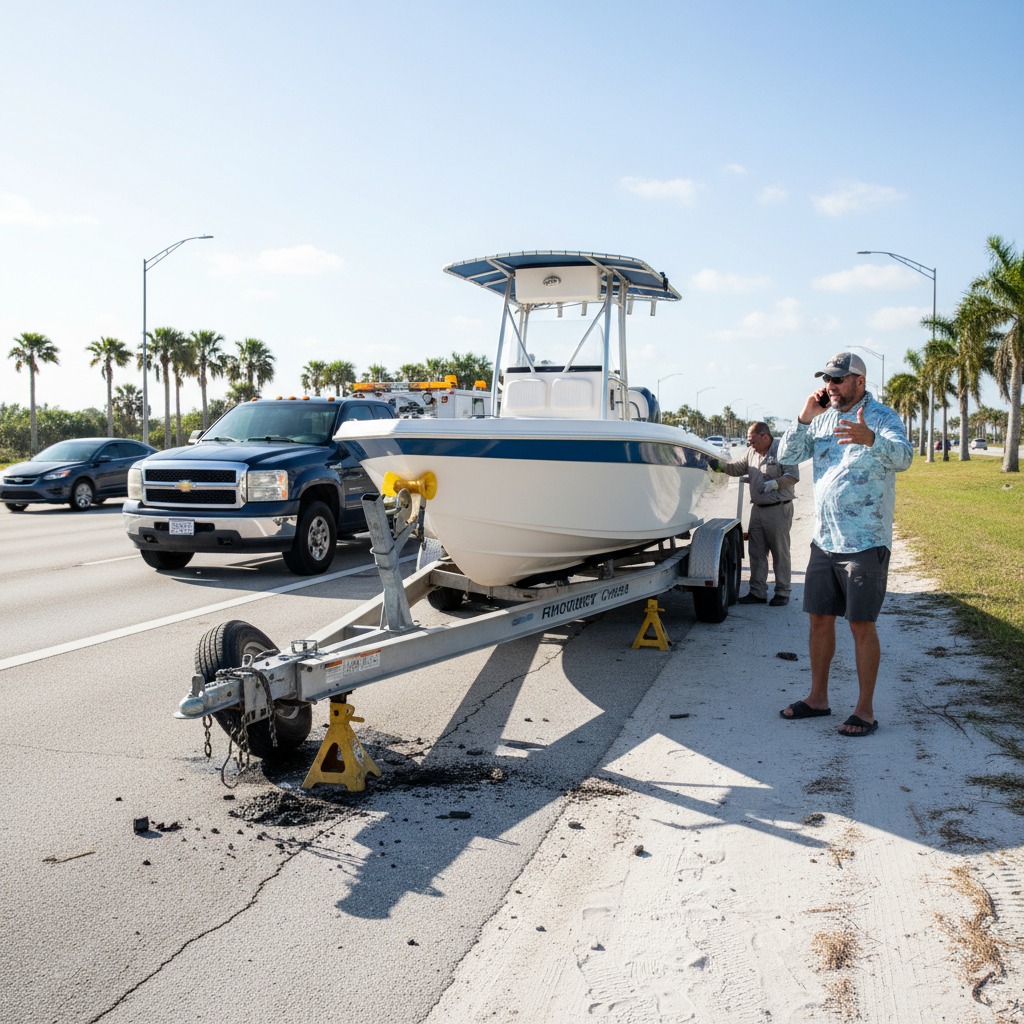I’ve spent more time on the side of the road with a busted boat trailer than I care to admit. I remember one perfect Saturday morning, client named Mark and I were heading to the Keys, his 24-foot center console in tow. We were cruising down US-1 when—BAM!—a shriek of metal and a cloud of smoke. A seized wheel bearing had taken out the entire hub. His perfect day was over before it even started.
That’s the thing about boat trailers. They are the unsung, and often unloved, heroes of our boating lives. We spend thousands on our boats, but the trailer they live on? It’s often an afterthought. That is, until you’re stranded on a hot highway. The reality is, most common problems with boat trailers are completely preventable.
As a marine mechanic in South Florida, I’ve seen it all. I’ve learned that a little bit of prevention is worth a truckload of cure. In this guide, I’m going to walk you through the most frequent issues I see, why they happen, and how you can avoid them. This isn’t just about fixing things; it’s about making sure your trip to the boat ramp is the most boring part of your day.
Table of Contents
The Most Common Problems with Boat Trailers (and How to Spot Them)
Let’s break down the culprits that leave boaters stranded. Understanding these is the first step in avoiding them.
1. Tire Troubles: The #1 Roadside Villain
If I had a dollar for every trailer I’ve seen on the side of the road with a tire issue, I could probably retire. This is, without a doubt, the leader in the clubhouse of common problems with boat trailers.
- The Cause: It’s rarely a simple puncture. More often, it’s under-inflation, which causes the tire to overheat and blow out. Or, it’s dry rot—the tires look fine, but they’re old, cracked, and brittle from sun exposure. Tires have a shelf life of about 3-5 years, no matter how much tread is left.
- My Advice: Buy a good tire pressure gauge and use it before every single trip. And look at your tires. I mean, really look at them. If you see little cracks in the sidewall, they’re done. Replace them.
2. Wheel Bearing Failure: The Silent Killer
This is the one that really scares me. A failed bearing can cause the wheel to literally fall off your trailer.
- The Cause: Water intrusion, especially saltwater. Every time you dunk your trailer to launch your boat, you’re giving water a chance to get past the seals and wash away the grease. Once the grease is gone, it’s metal-on-metal, and failure is just a matter of time.
- My Advice: Make annual bearing service a religion. Clean and repack them with fresh, high-quality marine grease. If you see even a hint of grease slinging out from behind the wheel, that’s a bad seal. Fix it immediately. This is one of the most serious common problems with boat trailers.
3. Brake System Breakdown: A Scary Stop
Trailer brakes live a hard life, especially down here in the salt.
- The Cause: Corrosion. Whether you have drum or disc brakes, saltwater is their mortal enemy. Calipers seize, brake lines rust from the inside out, and brake fluid gets contaminated with water.
- My Advice: After every single saltwater launch, rinse your brakes thoroughly with fresh water. And I mean a lot of fresh water. Exercise the brakes periodically, even when you’re not towing, to keep parts from seizing.
4. Lighting and Electrical Gremlins
There’s nothing more frustrating than having your trailer lights flicker or just refuse to work. It’s not just annoying; it’s illegal and dangerous.
- The Cause: Nine times out of ten, it’s a bad ground connection. The ground wire corrodes or comes loose, and the lights go haywire. Water getting into cheap, non-sealed connectors is the other major culprit.
- My Advice: Run a dedicated ground wire the full length of your trailer instead of relying on the frame. Use dielectric grease on all your connections and consider upgrading to fully sealed LED lights. This simple upgrade can eliminate many common problems with boat trailers.
5. Structural Rust and Frame Failure
Your trailer’s frame is its backbone. Once its integrity is compromised, you’re in big trouble.
- The Cause: Again, saltwater. It gets into the nooks and crannies of a steel trailer and eats it from the inside out. I’ve seen frames that looked okay from a distance but were so rusted you could poke a screwdriver through them.
- My Advice: Rinse, rinse, rinse. If you have a steel trailer, inspect it regularly for rust bubbles, especially around welds and cross-members. An aluminum trailer is a better long-term investment for saltwater use, but even they can have issues with hardware corrosion.

My Pre-Trip Inspection Checklist
Before I haul any boat, anywhere, I run through this quick checklist. It takes five minutes and has saved me countless headaches. Make this a habit.
| Category | What I Check | Why It Matters |
|---|---|---|
| Tires | Pressure in all tires (including spare). Visually inspect for cracks/bulges. | Prevents 50%+ of roadside failures. |
| Hitch | Coupler is locked on the ball. Safety chains are crossed and attached. | A loose trailer is a massive danger. |
| Lights | Connect to the truck and test running lights, brake lights, and turn signals. | Legal requirement and critical for safety. |
| Hubs | Briefly touch each wheel hub. If it’s hot, your bearings are in trouble. | Catches bearing failure before it’s catastrophic. |
| Tie-Downs | Transom straps are tight. Winch strap is snug and locked. | Your boat should be part of the trailer, not just sitting on it. |
FAQ: Questions I Always Get at the Ramp
How often should I really service my wheel bearings?
If you’re a freshwater boater, once a year is probably fine. If you dunk your trailer in saltwater, I’d say inspect them twice a year, and be prepared to service them annually, no excuses. This prevents one of the most costly common problems with boat trailers.
Is a galvanized or aluminum trailer better?
For saltwater, aluminum wins, hands down. It doesn’t rust. It costs more upfront, but it will last much longer and save you from the constant battle against corrosion, a major source of common problems with boat trailers.
My trailer lights never work right. What’s the deal?
It’s almost always a bad ground. Instead of grounding to the frame, run a dedicated white wire from your truck plug all the way back to your lights. This solves 90% of intermittent light issues.
How do I know if my trailer is overloaded?
Look at your trailer’s capacity plate. Then, get a real weight for your boat—not the “dry weight” from the brochure. That means with fuel, water, gear, and everything else. If you’re close to the limit, you’re probably over it. Overloading is a major contributor to common problems with boat trailers.
What’s the most overlooked maintenance item?
Lug nuts. Nobody ever checks them. They can and do come loose. Get a torque wrench and check them at the beginning of the season and a few times throughout the year.
Key Takeaways: My Final Advice
Look, your boat trailer doesn’t ask for much. A little attention goes a long, long way. If you want to avoid being “that guy” on the side of the road, just remember these things. This is the core of preventing the most common problems with boat trailers.
- Be Proactive, Not Reactive: Don’t wait for something to break. Regular maintenance is always cheaper and less stressful than an emergency repair on a busy highway.
- Tires and Bearings First: These are your weakest links. Give them the most attention. Check your tire pressure before every trip and service your bearings every year. This eliminates the two biggest common problems with boat trailers.
- Fresh Water is Your Best Friend: If you boat in saltwater, rinsing your trailer after every use is not optional. It’s the single best thing you can do to fight corrosion.
- Do Your Pre-Trip Check. Every. Single. Time. It takes five minutes. It can save your day, your boat, and maybe even your life.
- Don’t Overload It: Know your trailer’s weight limit and respect it. An overloaded trailer is an unsafe trailer.
Your trailer is the foundation of your boating adventures. Treat it well, and it will get you to the ramp and back home again, trouble-free, for years to come.
Author Bio
I’m Alex, a 15-year marine technician in South Florida, ABYC-certified. I’ve seen and fixed all the common problems with boat trailers, from seized bearings on I-95 to rusted-out frames at the boat ramp. I specialize in keeping my clients’ entire rig—boat, motor, and trailer—safe and reliable for the water.


Leave a Reply